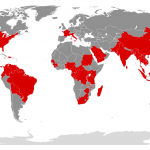 The mosquito-borne virus chikungunya may lead to severe brain infection and even death in infants and people over 65, according to findings published in Neurology.
The mosquito-borne virus chikungunya may lead to severe brain infection and even death in infants and people over 65, according to findings published in Neurology.
Chikungunya is not a new virus, but before 2004 it was considered nonfatal and unlikely to cause lifelong disabilities.
However, major outbreaks since 2005 have been attributed to a new strain, and severe or fatal cases have been seen with central nervous system (CNS) involvement in both adults and infants.
Chikungunya virus is transmitted through the bite of a mosquito that has become infected by feeding on an infected person.
It is most commonly spread by the same type of mosquitoes that transmit dengue virus.
The most frequent symptoms are fever and joint pain. Other symptoms may include headache, muscle pain, joint swelling or rash. Most people recover within a week, but for some, the joint pain can continue for months and even years.
Outbreaks in Africa and Asia, cases recorded in the US
Outbreaks have occurred in Africa, Asia, the Caribbean islands and, as of September 2015, more than 7,000 cases have been reported in Mexico, where the Centers for Disease Control and Prevention (CDC) currently have a Level 1 warning in place.
A number of cases have occurred in the US after people acquired the virus while traveling; the first locally transmitted case occurred in Florida in July 2015.
The current study was led by Dr. Patrick Gérardin, PhD, of Central University Hospital in Saint Pierre, Reunion Island.
The researchers reviewed a chikungunya outbreak that affected 300,000 people on Reunion Island, off the coast of Madagascar, in 2005-6.
They investigated the extent to which people with neurological symptoms at disease onset were still affected 3 years later.
17% fatality rate for chikungunya-related encephalitis
A total of 57 patients were diagnosed with chikungunya-associated central nervous system (CNS) disease, including 24 with encephalitis, or a rate of 8.6 per 100,000 people.
Encephalitis was more prevalent in infants and people over age 65. The incidence rate in infants was 187 per 100,000 people; it was 37 per 100,000 people in people over age 65.
The death rate for those with chikungunya virus-associated encephalitis was 17%. An estimated 30-45% of those infected with encephalitis suffered ongoing disabilities.
These included behavioral changes and problems with thinking and memory skills in infants and post-infectious dementia in previously healthy adults.
The consequences appeared to be particularly harmful in newborns.
The rate of brain infection, or encephalitis, from the chikungunya virus is higher than the rate seen in the US due to West Nile virus and similar infections between 1999-2007. In fact, the rates for the age categories are far higher than rates for encephalitis in the US from all causes combined, according to Dr. Gérardin.
He advises: “Since there is no vaccine to prevent chikungunya and no medicine to treat it, people who are traveling to these areas should be aware of this infection and take steps to avoid mosquito bites, such as wearing repellent and long-sleeves and pants if possible.”
Source: MNT – Medical News Today

















